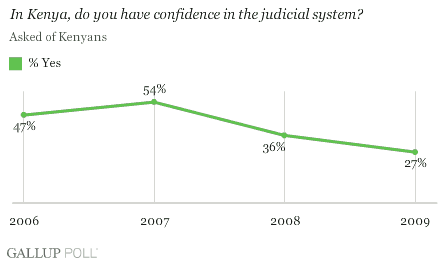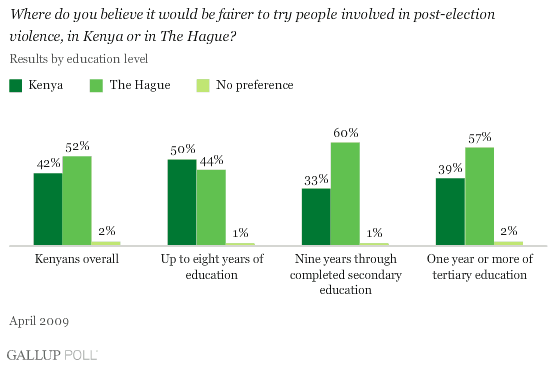WASHINGTON, D.C. -- Kenya's government last week announced judicial reform aimed at restoring the public's trust in the judiciary before trying offenders in the country's deadly post-election violence of early 2008. Gallup's April survey of Kenya reveals a daunting challenge -- 27% of Kenyans are confident in the country's judicial system, half the percentage that expressed confidence in 2007.

Lack of confidence in the judicial system is central to the politically charged debate over how to handle the cases of those accused of participating in the post-election violence last year that left more than 1,000 people dead. External mediator Kofi Annan recently granted Kenyan officials more time to establish a local tribunal to prosecute the offenders, but the prospect of including some international judges was met with resistance in the Kenyan cabinet, as it might open its own members to prosecution.
On July 30, Prime Minister Raili Odinga announced that the approach had been abandoned in favor of the country's normal court system. On Wednesday during her visit to Kenya, U.S. Secretary of State Hillary Clinton criticized the lack of progress in prosecuting offenders as symptomatic of the unchecked corruption stymieing the country's development. The International Criminal Court (ICC), which is now tasked with monitoring the situation, has said that if the Kenyan officials failed to establish a special tribunal, offenders would be tried at the ICC's facilities in The Hague.
Overall, Kenyans are somewhat more likely to say it would be fairer to try offenders in The Hague (52%), than to say it would be fairer to try them in Kenyan courts (42%). Results vary significantly by education level, with better-educated Kenyans more likely than those in the lowest education category to favor trial in The Hague.

Kenyans were also asked about the most appropriate sanction for those involved in the post-election violence. About three-fourths (74%) said offenders should be given a jail sentence, while 7% said they should receive the death penalty, and 3% said a monetary fine would be sufficient. Sixteen percent said those involved in the violence should receive amnesty and not be sanctioned at all.
For complete data sets or custom research from the more than 150 countries Gallup continually surveys, please contact worldpollpartners@gallup.com or call 202.715.3030.
Survey Methods
Results are based on face-to-face interviews with approximately 1,000 adults, aged 15 and older, conducted in April 2006, June 2007, and April 2009 in Kenya, and 2,200 adults, aged 15 and older, in August 2008 in Kenya. For results based on the 2006, 2007, and 2009 samples, one can say with 95% confidence that the maximum margin of sampling error is ±5 percentage points. For results based on the 2008 sample, one can say with 95% confidence that the maximum margin of sampling error is ±3 percentage points. The margin of error reflects the influence of data weighting. In addition to sampling error, question wording and practical difficulties in conducting surveys can introduce error or bias into the findings of public opinion polls.
